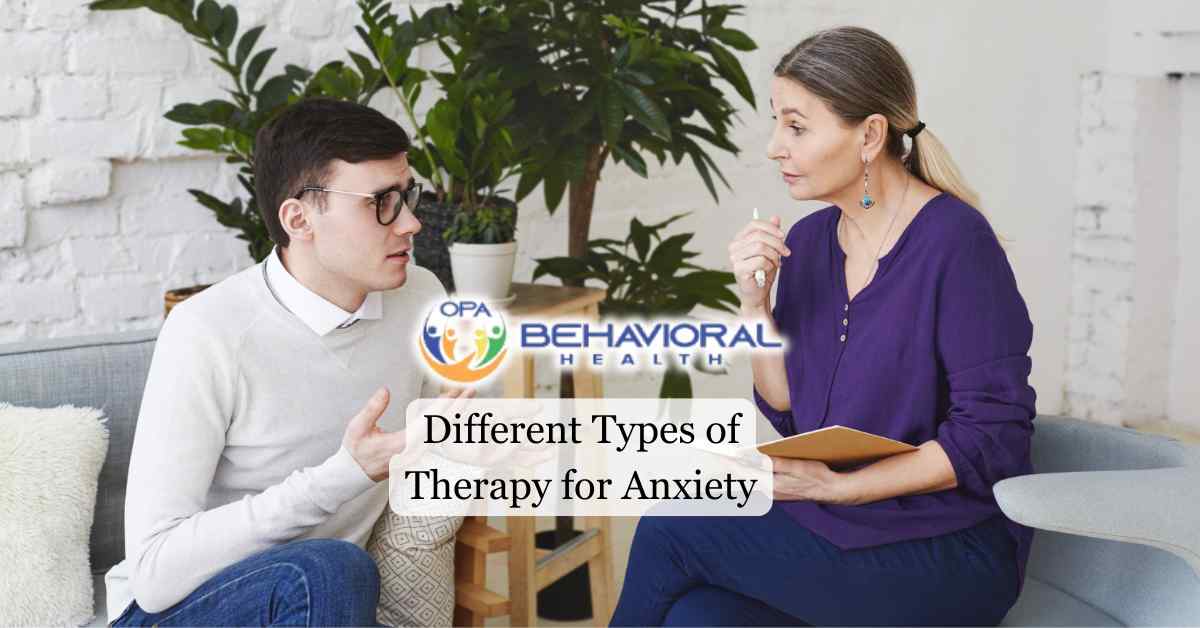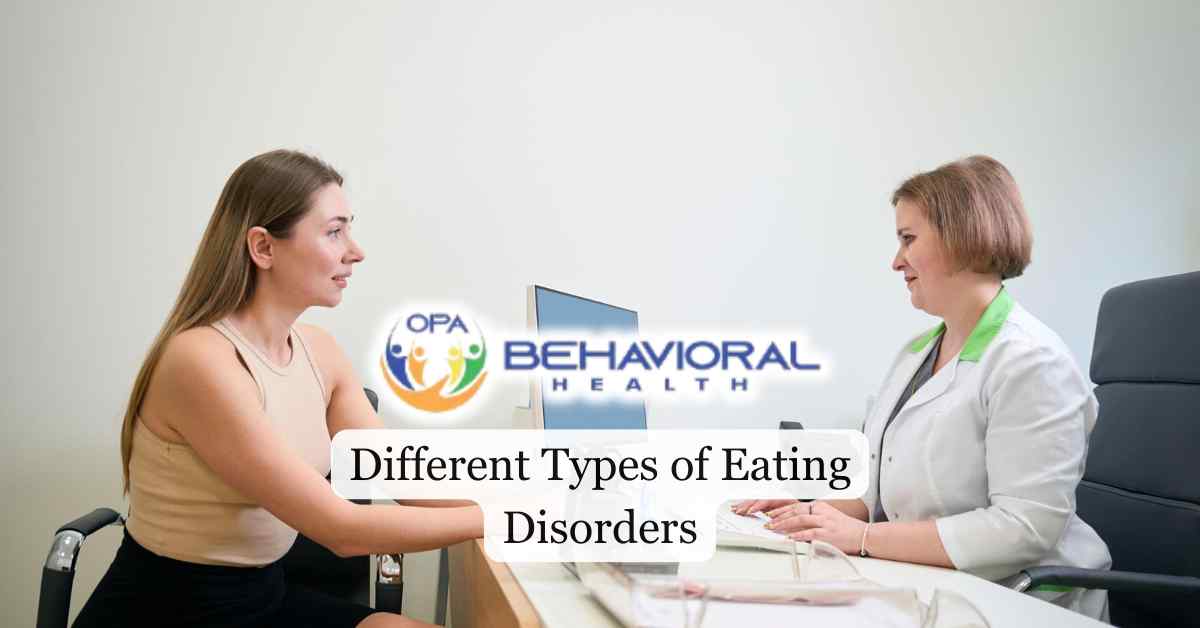Anxiety is a common mental health condition that impacts millions of people around the globe. It can take many forms, including generalized anxiety disorder, panic disorder, and social anxiety. Although anxiety can feel overwhelming and disruptive, various therapeutic approaches have been developed to help individuals manage and reduce their symptoms effectively.
In this article, we will help you understand the various types of therapy for anxiety and thus empower you to make informed choices about your treatment, leading to improved mental health and a more balanced life.

Cognitive-Behavioral Therapy (CBT)
Cognitive-Behavioral Therapy (CBT) is an evidence-based treatment that targets the negative thought patterns and behaviors associated with anxiety disorders. By identifying and changing these patterns, you can effectively reduce your anxiety symptoms within 12 to 16 weeks of treatment.
CBT empowers you by teaching coping skills and strategies to manage your anxiety, giving you a sense of control over your symptoms. Through techniques like cognitive restructuring and exposure therapy, you’ll learn to confront and gradually reduce your fears.
The versatility of CBT makes it applicable to various anxiety disorders, including generalized anxiety disorder (GAD), social anxiety disorder (SAD), and obsessive-compulsive disorder (OCD).
By focusing on the link between your thoughts, feelings, and actions, CBT helps you break the cycle of anxiety and develop healthier ways of thinking and behaving.
Exposure Therapy
As a form of cognitive-behavioral therapy, exposure therapy involves gradually exposing yourself to anxiety-provoking situations to help reduce your fear response over time.
This approach is effective for various anxiety disorders, including specific phobias, social anxiety disorder, panic disorder, and OCD.
Your therapist will guide you through a step-by-step process, starting with less challenging scenarios and progressively moving towards more anxiety-inducing situations.
You’ll learn coping strategies and build resilience as you confront your fears through methods like imaginal exposure (visualizing the feared situation), in vivo exposure (directly facing the fear), or virtual reality exposure (using simulations).
Through repeated exposure, you’ll discover that the feared outcomes are often less likely or less severe than anticipated, leading to a significant reduction in anxiety symptoms.
Check out what the Different Types of Anxiety Disorders are and be better aware of the varying symptoms each of them have.
Dialectical Behavioral Therapy (DBT)
Originally developed for treating borderline personality disorder, DBT has proven effective for various anxiety disorders, including generalized anxiety disorder, panic disorder, and PTSD. It focuses on helping you regulate emotions, tolerate distress, and improve interpersonal effectiveness to manage anxiety symptoms better.
Through individual sessions and skills training groups, you’ll learn and practice DBT strategies in a supportive environment. Research shows that dialectical behavioral therapy significantly reduces physical anxiety symptoms and enhances coping skills, equipping you with tools to navigate stressors and emotional challenges.
By emphasizing the importance of acceptance and change, DBT helps you understand your emotions while encouraging proactive steps towards personal growth and improved mental health.
Read more about the Signs it’s Time To Seek Professional Help for Anxiety and make early intervention a priority.
Acceptance and Commitment Therapy (ACT)
Acceptance and Commitment Therapy (ACT) offers a unique approach to managing anxiety by emphasizing the acceptance of thoughts and feelings as valid experiences rather than attempting to control or avoid them. This shift in perspective can help you face your anxieties more effectively.
ACT encourages you to identify your core values and commit to actions that align with those values, fostering a sense of purpose even when anxiety persists. Through mindfulness techniques, you’ll learn to stay present and engaged in your life, enhancing your emotional resilience.
ACT is effective in reducing anxiety levels, particularly for social anxiety, test anxiety, and obsessive-compulsive disorder (OCD). By cultivating psychological flexibility—the ability to adapt to changing circumstances and persist in the face of challenges—ACT ultimately improves overall mental health outcomes.
Read more about the most common anxiety causes and learn how to develop effective strategies to manage and treat this disorder.

Psychodynamic Therapy
Psychodynamic therapy is another approach to treating anxiety that delves into your unconscious processes and past experiences to uncover and resolve emotional conflicts contributing to your anxiety.
This therapy typically requires a longer-term commitment, with sessions often lasting around two years, focusing on developing self-awareness and insight into your personal motivations.
The therapeutic relationship is central to psychodynamic therapy, providing a safe space for you to express feelings and explore underlying issues related to your anxiety.
Interpersonal Therapy (IPT)
Interpersonal Therapy (IPT) offers a structured, time-limited approach to treating anxiety, focusing on improving your relationships and social functioning. Typically lasting 12 to 16 weeks, IPT addresses the connection between social roles, relationships, and emotional health, helping you communicate more effectively and express your feelings in a healthy manner.
The therapy emphasizes four key areas: unresolved grief, role disputes, role transitions, and interpersonal deficits, which can contribute to anxiety symptoms.
IPT sessions typically involve diagnosing the issue, developing strategies, and slowly reducing the number of sessions over time. Research shows that this method works well in both traditional and online therapy formats. If you want to learn more information and are seeking support, OPA Behavioral Health offers anxiety treatment options designed specifically for you.
Final Thoughts from OPA Behavioral Health
The choice of therapy depends on factors such as the specific type of anxiety disorder, individual preferences, and the therapist’s expertise. By working with OPA Behavioral Health’s qualified mental health professionals will help you determining the most appropriate therapeutic approach for managing anxiety.
At OPA Behavioral Health, we are dedicated to offering personalized and compassionate care that meets the unique needs of each patient. With the convenience of telemedicine and a variety of services designed to support your well-being, you can receive the care you deserve from the comfort of your home or visit one of our locations in Florida.








